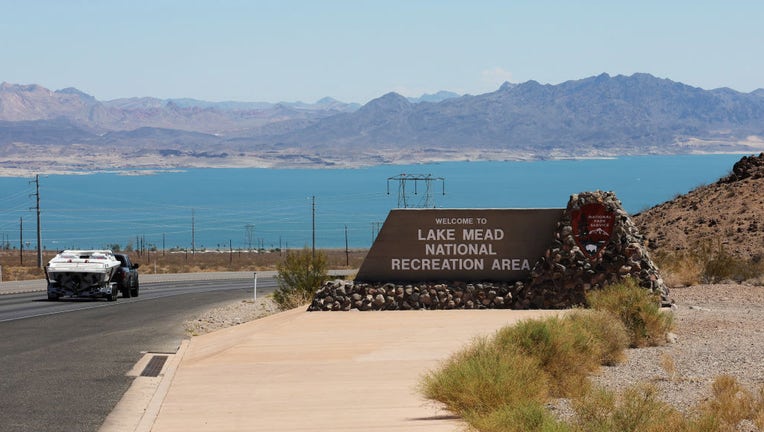High levels of 'fecal bacteria' close popular Lake Mead tourist spot, NPS says

FILE - A vehicle towing a boat drives past a sign welcoming visitors to the Lake Mead National Recreation Area on July 1, 2022 in the Lake Mead National Recreation Area, Nevada. (Photo by Ethan Miller/Getty Images)
LAS VEGAS - Travelers planning a visit to Lake Mead National Recreation Area in Nevada and Arizona are being warned of a temporary closure due to "high levels of fecal bacteria."
The National Park Service reported the issue in Arizona Hot Springs in a notice posted online.
"Based on high levels of fecal bacteria in Arizona Hot Springs, the following park areas and facilities are closed, effective immediately, until further notice," the NPS said.
"Arizona Hot Springs Trail, Arizona Hot Springs, and the White Rock Canyon parking lot on US-93," the alert added.
NPS said park officials were working to improve water quality over the next several days, including "sandbag removal and other measures," and planned to reopen the areas once water quality meets federal and state safety standards.
"This a reminder to the public to follow leave-no-trace principles, which include packing out trash and human waste (feces)," the NPS said.
Arizona Hot Springs is a popular spot for hikers in the Lake Mead National Recreation Area.

Human remains found in Lake Mead
Authorities in Nevada are investigating two instances of human remains found in Lake Mead after the water level severely dropped due to drought conditions.
Last month, officials with Lake Mead National Recreation Area issued a warning that a brain-eating amoeba called Naegleria fowleri was found in hot springs at the hot springs below the Hoover Dam. The Hoover Dam spans the Arizona-Nevada border about 30 miles southeast of Las Vegas.
"Naegleria fowleri has been found in hot springs," a spokesperson for Lake Mead National Recreation Area said in October. "This amoeba enters through the nose and can cause a deadly infection that causes a sudden and severe headache, fever, and vomiting."
Health officials in Arizona later said testing on a suspected infection cause by Naegleria fowleri in the state came back negative.
While extremely rare, Arizona has seen cases of infections caused by Naegleria fowleri in the past. A total of nine have been confirmed between 1962 and 2022, according to FOX 10 Phoenix, citing figures from the U.S. Centers for Disease Control and Prevention.
This story was reported from Cincinnati. FOX News contributed.

